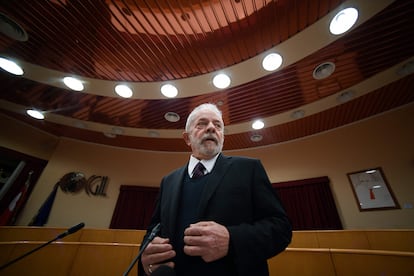At OAS summit, Brazil seeks to soften criticism of Nicaragua’s government
‘The submitted proposals are intended to question the unprecedented brutality applied by the dictatorship of Ortega and Murillo,’ claim denationalized Nicaraguan dissidents


Just hours before the start of the General Assembly of the Organization of American States (OAS) in Washington, D.C., the government of Brazilian President Luiz Inácio Lula da Silva is keeping diplomatic and political tempers high due to proposed corrections to a statement critical of the government of Daniel Ortega and Rosario Murillo in Nicaragua.
The Brazilian delegation made “substantive changes” to a document prepared by the United States, Canada, Costa Rica and Antigua and Barbuda on “the escalation of repression, the closure of civic space and human rights violations” in Nicaragua. Despite the conclusive reports by the United Nations group of experts and the Interdisciplinary Group of Independent Experts (GIEI), the Brazilian delegation questioned the commission of crimes against humanity by the Sandinista administration. The Brazilian diplomats eliminated the words “alarming conclusion” and replaced it with “there are elements.”
Moreover, the Brazilian diplomats added the word “alleged” to the passage about infringement of property and social security rights through the confiscation of property and assets and the denial of pensions for individuals deprived of their nationality by the Nicaraguan government, and which the promoters of the original declaration had emphasized.
Brazil also completely removed the mention of the dramatic levels of migration by Nicaraguans who have fled due to political persecution and the socio-political crisis raging since 2018, the year of massive social protests against the regime. On Tuesday, the Human Rights Collective Nicaragua Never Again denounced that this is the largest exodus in the history of Nicaragua, greater even than that of the 1980s, when the country fought a civil war that left tens of thousands dead: “At least 605,043 Nicaraguans have left their country in the last 62 months, nine percent of the total population, due to state repression against opponents, religious leaders and critics of the government of Daniel Ortega,” they remarked.
The observations made by Brazil in an official document circulating in the OAS system refrain from urging the Ortega regime to cease its arbitrary detentions. In this document, references to the repressive acts documented by national and international organizations are described not as “have” but as “may have” occurred, such as stripping opponents, journalists and religious leaders of Nicaraguan nationality.
“The proposals presented by Brazil seek to cast doubt on the unprecedented brutality applied by the Ortega and Murillo dictatorship against thousands of citizens, and they offend the relatives of those who were murdered as well as all the victims of the repression of Ortega and Murillo’s totalitarian state,” says a statement issued by a group of the 94 denationalized opponents.
“We support the original declaration proposal, presented by the five member countries of the Follow-up Group on the Nicaraguan crisis — which we have been suffering since 2018 — and which must be approved by the OAS General Assembly. Likewise, we reject the attempts of the Brazilian diplomatic delegation seeking to soften the terms with which the declaration had been drafted,” they insist, while asking the countries in the region to declare the Sandinista government “illegitimate.”
“Morally and ideologically indebted to Ortega”
The former Sandinista ambassador to the OAS until March 2022, Arturo Mcfields, has two theories about this change in Brazil’s position. “Lula is in some way morally and ideologically indebted to Ortega, because when he was a simple trade unionist in the 1980s, he came to Nicaragua and managed to meet Fidel Castro. Lula always saw Fidel as a mentor,” says the ex-diplomat, who was stripped of his nationality.
The other scenario that Mcfields considers is that Lula, after winning a new term in office, is trying to assume the leadership of the Latin American left in light of the “failure” of Mexican President Andrés Manuel López Obrador in this regard. “Lula believes that this leadership will not be complete until the complete integration of the dictatorships of Nicaragua, Venezuela and Cuba takes place. So he is trying to perform this image washing and change of narrative with Ortega, just as he did with Maduro,” he argues.
A source with ties to Brasília said that in Brazilian diplomacy “there are several currents of thought regarding Nicaragua” and that “the position of Lula’s government has been changing.” For now, it is not clear whether the other countries have accepted the changes proposed by the Brazilian delegation to the declaration against Nicaragua, a country that will leave the organization next November on Ortega’s decision. The regime in Managua refuses to build bridges with the international community, not even with the Latin American left led by Chilean President Gabriel Boric. Instead, it has stepped up internal repression.
The OAS General Assembly will begin on June 21 with several challenging points on the agenda, especially regarding Nicaragua. “In the OAS, there is a negative correlation of forces for democracy,” says McFields. “The OAS is made up of 35 nations, but since the three dictatorships are relatively excluded from the OAS, there are 32. That is, nine democracies and 23 countries that are either authoritarian or sympathetic to authoritarianism.”
Sign up for our weekly newsletter to get more English-language news coverage from EL PAÍS USA Edition
Tu suscripción se está usando en otro dispositivo
¿Quieres añadir otro usuario a tu suscripción?
Si continúas leyendo en este dispositivo, no se podrá leer en el otro.
FlechaTu suscripción se está usando en otro dispositivo y solo puedes acceder a EL PAÍS desde un dispositivo a la vez.
Si quieres compartir tu cuenta, cambia tu suscripción a la modalidad Premium, así podrás añadir otro usuario. Cada uno accederá con su propia cuenta de email, lo que os permitirá personalizar vuestra experiencia en EL PAÍS.
¿Tienes una suscripción de empresa? Accede aquí para contratar más cuentas.
En el caso de no saber quién está usando tu cuenta, te recomendamos cambiar tu contraseña aquí.
Si decides continuar compartiendo tu cuenta, este mensaje se mostrará en tu dispositivo y en el de la otra persona que está usando tu cuenta de forma indefinida, afectando a tu experiencia de lectura. Puedes consultar aquí los términos y condiciones de la suscripción digital.








































